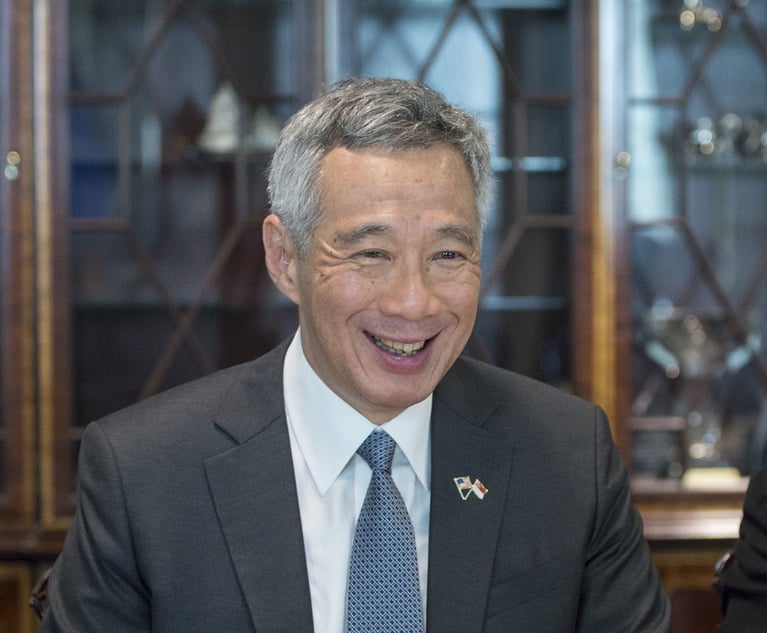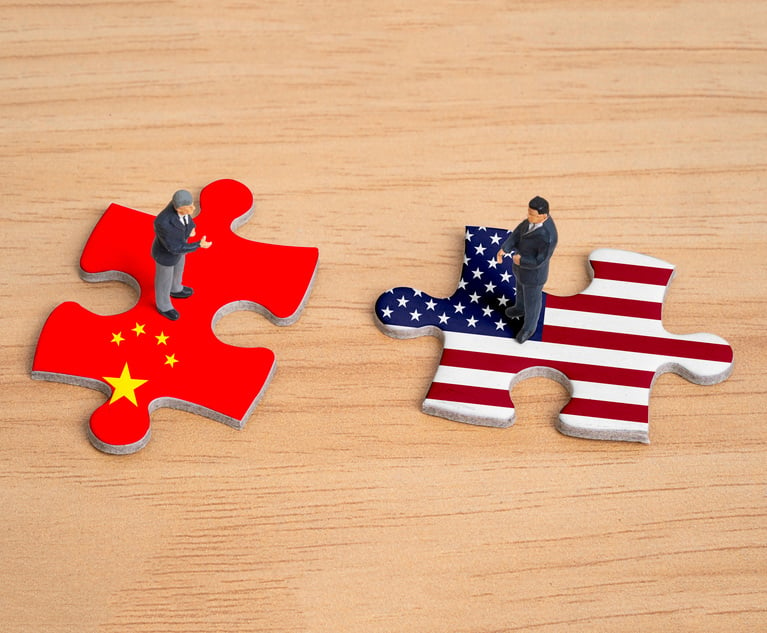Links among just four firms to win Singapore licences after 23 apply
Linklaters, Gibson Dunn & Crutcher, Jones Day and Sidley Austin have been awarded Qualifying Foreign Law Practice (QFLP) licences in Singapore as the Asian city state takes further steps to liberalise its legal market. The four international firms were among a list of 23 which applied for QFLPs in the period between 1 July to 31 August last year, with other hopefuls including UK outfits Berwin Leighton Paisner, DLA Piper, Ashurst, Olswang, Watson Farley & Williams and Stephenson Harwood, alongside American counterparts K&L Gates and Shearman & Sterling.
February 19, 2013 at 04:18 AM
4 minute read
Linklaters, Gibson Dunn & Crutcher, Jones Day and Sidley Austin have emerged as the successful bidders for the second round of Singapore's Qualifying Foreign Law Practice (QFLP) licences, seeing off competition from a raft of UK and international rivals.
The four global firms were among a list of 23 that applied for QFLPs in the period between 1 July and 31 August 2012, with other hopefuls including Berwin Leighton Paisner, DLA Piper, Ashurst, Olswang, Watson Farley & Williams and Stephenson Harwood, as well as US firms K&L Gates and Shearman & Sterling.
The new licences will allow the firms to practise Singapore law in all areas except domestic aspects of litigation and general practice, such as criminal law, retail conveyancing, family and administrative law.
Singapore's Ministry of Justice (MoJ) said that its evaluation and selection committees took into account the value of offshore work that the firm's Singapore office would generate, as well as the number of lawyers who would be based in Singapore and the practice areas the firm would offer.
They also considered the extent to which Singapore would function as headquarters for the firm in Asia, as well as the firm's global track record.
Successful firms now have up to six months from 1 April this year to commence their operations as QFLPs, with the licences valid for an initial period of five years.
Matthew Sheridan, a partner at Sidley in Singapore, said: "Right now, we are principally a corporate finance practice. But there are three areas where we see growth: funds, life sciences, and energy and infrastructure, and all the practices that come with that."
Likewise, Jai Pathak at Gibson Dunn said the firm will look at new practice areas: "We are already in M&A, private equity, infrastructure energy and financing. We will, with this licence, think about expanding into new areas such as international arbitration and international litigation, fund formation and related aspects of that work.
"This opens up a vast pool of talented local lawyers [we will look to hire from], particularly for the existing practice areas where we haven't hired Singapore-trained lawyers as we were not able to do so."
The small number of licences handed out is likely to have come as a disappointment to those that applied, some of whom were expecting around six or seven licences to be awarded.
It is understood the decision to grant just four could have been due to push-back from local firms, as well as a possible desire to restrict international firms' work to mostly cross-border transactions, capital markets work and arbitration where possible.
"Singapore law is a very small piece of the work we do in Southeast Asia," said Matthew Bersani, Asia managing partner for Shearman.
"[Most of what] we do is cross-border. So obviously, we're interested in acquiring that capability, but it doesn't have any short-term impact on us at all. If firms are doing a lot of Singapore law-related work, it matters more."
The decision to open up Singapore's legal market to international firms was first announced in 2008 in a bid to boost competition in the market and reinforce the city state's position as a global and regional legal services hub.
According to the MoJ, the nominal value of the legal services sector has increased by more than 25% since 2009, rising from S$1.5bn (£792m) in 2008 to around S$1.9bn (£1bn) in 2012, with particular growth seen in arbitration activities.
This content has been archived. It is available through our partners, LexisNexis® and Bloomberg Law.
To view this content, please continue to their sites.
Not a Lexis Subscriber?
Subscribe Now
Not a Bloomberg Law Subscriber?
Subscribe Now
NOT FOR REPRINT
© 2025 ALM Global, LLC, All Rights Reserved. Request academic re-use from www.copyright.com. All other uses, submit a request to [email protected]. For more information visit Asset & Logo Licensing.
You Might Like
View All
Singapore Leaders Stress the Importance of the Rule of Law Amid Geopolitical Tensions

Can Law Firms Avoid Landing on the 'Enemy' List During the Trump Administration?
5 minute read

Letter From Asia: Will Big Law Ever Bother to Understand Asia Again?
Trending Stories
- 1Reviewing Judge Merchan's Unconditional Discharge
- 2With New Civil Jury Selection Rule, Litigants Should Carefully Weigh Waiver Risks
- 3Young Lawyers Become Old(er) Lawyers
- 4Caught In the In Between: A Legal Roadmap for the Sandwich Generation
- 5Top 10 Developments, Lessons, and Reminders of 2024
Who Got The Work
J. Brugh Lower of Gibbons has entered an appearance for industrial equipment supplier Devco Corporation in a pending trademark infringement lawsuit. The suit, accusing the defendant of selling knock-off Graco products, was filed Dec. 18 in New Jersey District Court by Rivkin Radler on behalf of Graco Inc. and Graco Minnesota. The case, assigned to U.S. District Judge Zahid N. Quraishi, is 3:24-cv-11294, Graco Inc. et al v. Devco Corporation.
Who Got The Work
Rebecca Maller-Stein and Kent A. Yalowitz of Arnold & Porter Kaye Scholer have entered their appearances for Hanaco Venture Capital and its executives, Lior Prosor and David Frankel, in a pending securities lawsuit. The action, filed on Dec. 24 in New York Southern District Court by Zell, Aron & Co. on behalf of Goldeneye Advisors, accuses the defendants of negligently and fraudulently managing the plaintiff's $1 million investment. The case, assigned to U.S. District Judge Vernon S. Broderick, is 1:24-cv-09918, Goldeneye Advisors, LLC v. Hanaco Venture Capital, Ltd. et al.
Who Got The Work
Attorneys from A&O Shearman has stepped in as defense counsel for Toronto-Dominion Bank and other defendants in a pending securities class action. The suit, filed Dec. 11 in New York Southern District Court by Bleichmar Fonti & Auld, accuses the defendants of concealing the bank's 'pervasive' deficiencies in regards to its compliance with the Bank Secrecy Act and the quality of its anti-money laundering controls. The case, assigned to U.S. District Judge Arun Subramanian, is 1:24-cv-09445, Gonzalez v. The Toronto-Dominion Bank et al.
Who Got The Work
Crown Castle International, a Pennsylvania company providing shared communications infrastructure, has turned to Luke D. Wolf of Gordon Rees Scully Mansukhani to fend off a pending breach-of-contract lawsuit. The court action, filed Nov. 25 in Michigan Eastern District Court by Hooper Hathaway PC on behalf of The Town Residences LLC, accuses Crown Castle of failing to transfer approximately $30,000 in utility payments from T-Mobile in breach of a roof-top lease and assignment agreement. The case, assigned to U.S. District Judge Susan K. Declercq, is 2:24-cv-13131, The Town Residences LLC v. T-Mobile US, Inc. et al.
Who Got The Work
Wilfred P. Coronato and Daniel M. Schwartz of McCarter & English have stepped in as defense counsel to Electrolux Home Products Inc. in a pending product liability lawsuit. The court action, filed Nov. 26 in New York Eastern District Court by Poulos Lopiccolo PC and Nagel Rice LLP on behalf of David Stern, alleges that the defendant's refrigerators’ drawers and shelving repeatedly break and fall apart within months after purchase. The case, assigned to U.S. District Judge Joan M. Azrack, is 2:24-cv-08204, Stern v. Electrolux Home Products, Inc.
Featured Firms
Law Offices of Gary Martin Hays & Associates, P.C.
(470) 294-1674
Law Offices of Mark E. Salomone
(857) 444-6468
Smith & Hassler
(713) 739-1250








